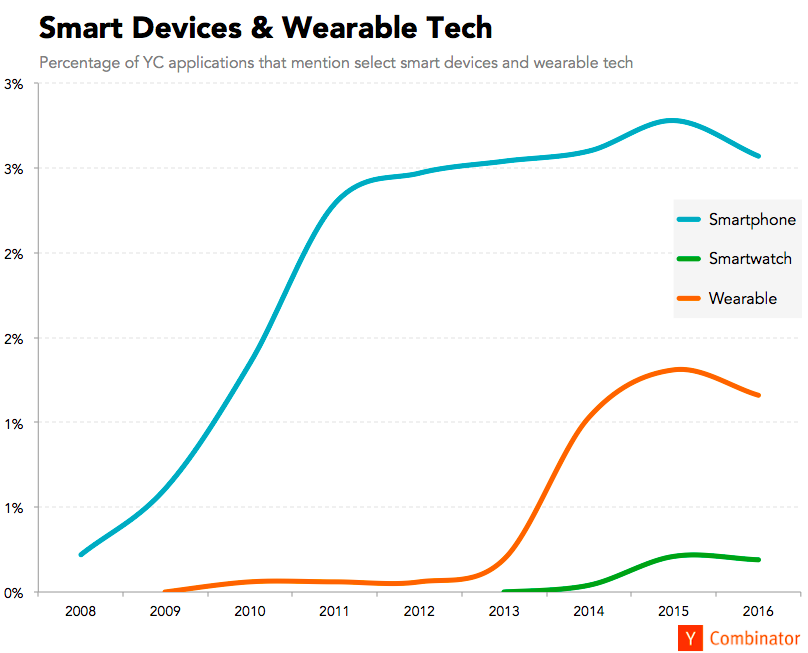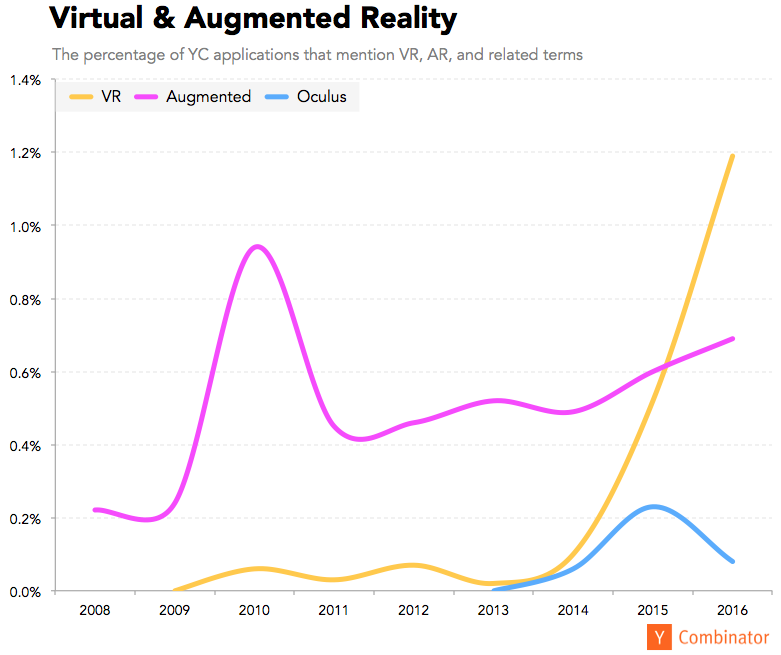New statistics from Y Combinator will tell startups the direction of development

Venture fund YCombinator decided to share statistics on its projects with the world. Previously published data only on the most successful and promoted of them. Now the fund will lay it out as is.
This information will allow you to draw certain conclusions about the prospects of a particular direction. Moreover, this fund and its startup accelerator sets the tone for the global IT industry, so to speak.
On the blog, YC unveiled common “numbers” for all companies that went through the caring hands of the fund. Representatives of the fund honestly made a reservation that these data are "not perfect." However, a general trend is being traced.
Total valuation of companies: $ 65 billion
Total amount of investments attracted by companies: $ 7 billion
Number of companies with a valuation of more than $ 1 billion: 8
(This includes the company Twitch, recently acquired by Amazon. The transaction value amounted to almost $ 1 billion)
Number of companies valued more than $ 100 million : more than 40
Number of companies that finances the YC: about 940
Number of dissolute companies that financed the YC: 177
Number of companies in the final set of a start-up accelerator: 107
Number of companies (in the final set), works constituents in the directions hardware + biotech + healthcare: 32
According to YC, about 1,000 companies participated in its programs.
They want to become "stars"
According to Jared Friedman, Y Combinator partner, since 2008, management has reviewed tens of thousands of applications for the program. Friedman writes that an analysis of all applications gives an idea of how the technology industry is changing, but until 2016, the accelerator team did not conduct such studies.
In their applications, novice entrepreneurs indicate the niche and relevant companies with which they would like to compete. At the same time, the accelerator partner notes, large startups, for example, Airbnb and Uber, also fall into the list of the most mentioned competitors.

Statistics on mentions of competitors
Since 2005, many well-known projects have passed through Y Combinator - Reddit, Loopt, Clustrix, Scribd, Wufoo, Xobni, Weebly, Dropbox, Twitch, Heroku, Machine Zone, Airbnb, Cloudkick, Bump, WePay and so on.
And there are more modest ones who have not yet made themselves known to the whole world. Most of these projects are, but they are also important for creating an overall picture of the industry. New tools on the YC website let you know when they appeared in the accelerator and in which direction they work.


Here are some startups that have passed the acceleration program in 2016.
Developer Tools Category:
• ConstructVR - a platform for testing, managing and deploying applications for virtual reality devices.
• DevColor is a community of black software developers.
• Exponent - an engine for developing mobile games.
• MessageBird - API for sending SMS, text and voice messages.
• Metapacket - a corporate system for diagnosing and preventing hacker attacks and other security threats.
• Opsolutely - a service for the automatic deployment of “one-click” software.
• Women Who Code- a community of women developers helping them in their career growth
• ZeroDB - a secure “cloud” platform for storing large amounts of data.
The number of startups in this category has not changed year on year.
Enterprise Category:
• Instumentl - grant search system for scientists.
• Livement - an application for ordering tickets for sports events and food in stadiums.
• Seneca Systems - government software.
• Smartpath - a mobile financial adviser and planner.
• WorkRamp - a system for training employees in the company.
Compared to 2015, in 2016 the number of startups in this category has significantly decreased.
Hardware Category:
• Airo Health - a “smart” bracelet that tracks the amount of calories consumed and consumed.
• Amberbox - a system for tracking and preventing attacks with firearms.
• ApolloShield - a system for protecting territories from unwanted visits by quadrocopters.
• Aptonomy - drones for the protection of premises or territories.
• GTrack - software for companies from the oil and gas industry. Helps identify promising raw material deposits.
•Raptor Maps is a service for farmers, which helps to analyze the condition of crops by shooting from drones.
• Validere - equipment for testing industrial designs.
Compared to 2015, in 2016 the number of startups in this category increased again. In the past few years, the number of start-ups involved in technical devices and biotechnology has significantly increased among applicants. This is partly due to a change in the policy of accepting startups into an accelerator, which used to focus on the selection of software projects, Friedman writes.

Many startups are developing applications for wearable devices and creating such gadgets.

The number of projects in the field of virtual reality is growing rapidly.
One of the main trends of the latest Y Combinator kits, Friedman notes, is artificial intelligence. “Startups apply similar technologies to all areas of life.”
This year, projects from the Enterprise category seemed to YC experts less promising than startups from Developer Tools and Hardware.
Data for other categories and years is available on the corresponding YC website page .
